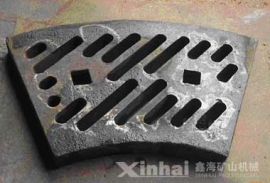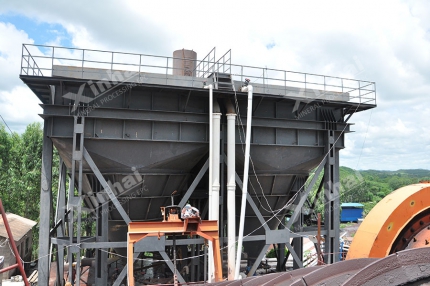Today, some small and old mines are still using the old-fashioned thickener, whose enrichment effect is very poor. That because the design of early equipment is not perfect, such as lower tank ledge, internal overflow groove, overlapping scraper, etc.
So, how to improve the efficiency of the old thickener? Here are several solutions from Xinhai.

Use the table of contents below to navigate through the guide:
01Deepen the ledge of the settling tank
The production capacity of settling tank has nothing to do with the height of ledge, which mainly depends on the settling velocity and settling area of the tank body. In fact, the solid particles of the concentrating tank are not settling freely in the static liquid. Their settling velocity is decreased with the increasing slurry concentration in the declining process. When the section reaches the critical speed, it is difficult to control the thickening effect if the ledge is too shallow. Therefore, increasing the height of tank body appropriately under the condition of controlling the degree of clarification can increase the overflow speed of the clarifying liquid by 4-6 times, and change the sedimentation tank from five layers to three layers, and the overflow yield can be increased by more than 30% if pulling out the second and fourth layer.

02Improve the control way of flow
The earliest thickeners usually adopted built-in overflow channels, which has a large distance between the top of the tank (81cm) and covered by wooden boards, so the operator could not observe the situation of overflow, which results in the submergence of overflow channels and failure of overflow. The improvement method is to change the outlet control valve of the old thickener into the inlet control valve, and the concentration capacity and the concentration effect can be controlled by the inlet control valve. In this way, the liquid supernatant can be discharged in time, which ensures that the overflow channel will not be submerged.

03Change the structure of scraper
The old thickener generally adopts two pairs of I-beam scraper, which is installed as the cross. There is space between the scraper blade of each scraper blade, so the moving distance of sediment is very short during the scarpering. Therefore, the internal sediment must be scraped repeatedly by long and short scraper to discharge the slurry.
If you want to improve, it is better to change the scraper into two symmetrical trussed scrapers. And the section of the truss is triangular, the front and back scraper overlaps with each other by 10-30mm. The height of the scraper is determined according to the amount of sediment. This design can guarantee continuous scraping, and has the advantages of light weight, good stability, good bending performance and small running resistance.

04Change the checking way
Generally, the thickener needs to be stopped for slotting inspection every two months, which is mainly used to remove the hard sediment on the bottom of the tank and reduce the fault. However, the old thickener often suffered from too much and overcrowded sediment on the bottom of the tank caused by unreasonable structure design, which makes the scraper difficult to move.
However, we can improve this problem through an automatic inspection device. Installing a set of automatic measuring and discharging system at the bottom of the thickener tank can adjust the sediment discharging according to the requirements.


 marketing@ytxinhai.com
marketing@ytxinhai.com  0086 13810327080
0086 13810327080 






































































































 CHAT
CHAT MESSAGE
MESSAGE





